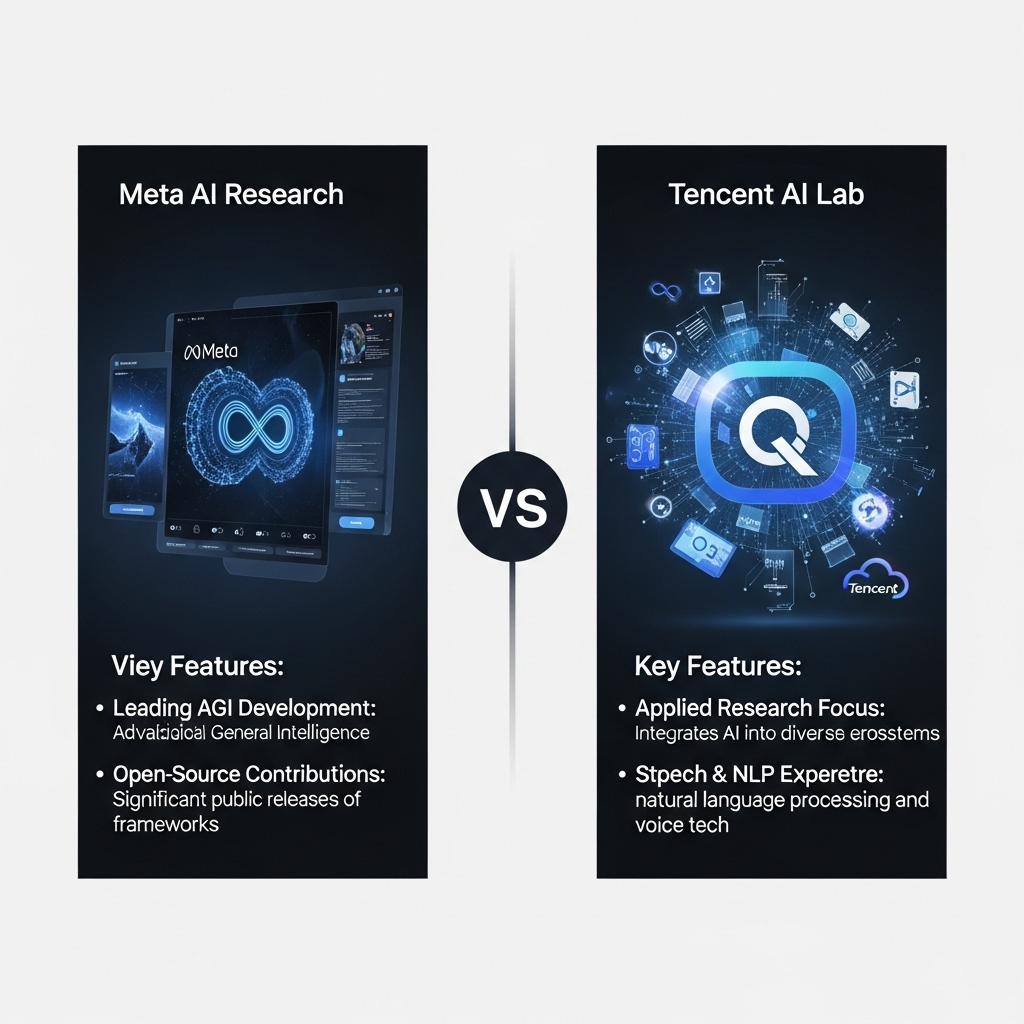Ai research labs: Meta AI Research vs. Tencent AI Lab
Quick Verdict
Both Meta AI Research and Tencent AI Lab are significant players in the AI research landscape, with Meta AI Research having a broader scope and more detailed information available, while Tencent AI Lab is more focused on practical applications within its own ecosystem.
- Meta AI Research has a broader focus and more extensive open-source initiatives.
- Tencent AI Lab focuses on practical applications within Tencent products.
- Both labs actively publish in top-tier AI conferences and collaborate with academic institutions.
- Meta AI Research has more detailed information available regarding ethical AI development and computational resources.

Key features – Side-by-Side
| Attribute | Meta AI Research | Tencent AI Lab |
|---|---|---|
| Focus Areas | Generative AI, Computer Vision, NLP, Machine Learning, Robotics, AI Infrastructure, AI for Social Good, AI Chemistry | Computer vision, speech technology, NLP, and machine learning. Applications in gaming, digital personas, content, and social AI. Also explores innovative combinations of AI with sectors such as life sciences, healthcare, agriculture, and manufacturing. |
| Open-Source Projects and Datasets | MMCSG, Speech Fairness Dataset, Casual Conversations V2, Common Objects in 3D (CO3D), Segment Anything, DISC21 Dataset, EgoObjects Dataset, FLoRes Benchmarking Dataset, Ego4D, LeanUniverse | ML-Images (18 million images, 11,000+ object categories), ResNet-101, NLP dataset (vector representations for 8 million Chinese words/phrases), KvPI dataset |
| Collaboration with Academic Institutions | Actively collaborates, provides resources, AI Alliance, joint Ph.D. program with Hebrew University, AILA with Georgia Tech | Collaborates with top universities and institutions, 'Rhinoceros Bird' research project |
| Funding and Resources | Invests around $40 billion annually, provides financial and hardware resources, access to computational infrastructure | Benefits from Tencent's significant investments in AI |
| Ethical AI Development | AI Principles, prioritizes user privacy, robust security measures, transparent AI systems, responsible AI development | Not available |
| Computational Resources and Infrastructure | Custom silicon chips, AI-optimized data center, Research SuperCluster (RSC) AI Supercomputer with 16,000 GPUs, MTIA chip family, two 24k GPU clusters, aiming for 350,000 NVIDIA H100 GPUs by end of 2024 | Uses Tencent AI Lab's computing and data resources |
Overall Comparison
Focus: Meta broader; Open Source: Meta more extensive; Ethics: Meta explicit; Funding: Both significant
Pros and Cons
Meta AI Research
Pros:
- Focus on Generative AI
- Focus on Computer Vision
- Focus on Natural Language Processing (NLP)
- Focus on Machine Learning
- Focus on Robotics
- Focus on AI Infrastructure
- Focus on AI for Social Good
- Focus on AI Chemistry
- Availability of open-source projects and datasets
- Collaboration with academic institutions
- Significant funding and resources
- Ethical AI development and deployment practices
- Advanced computational resources and infrastructure
- Internal knowledge sharing and collaboration
Cons:
- Employee satisfaction and work-life balance information not available
Tencent AI Lab
Pros:
- Strong focus on practical applications of AI in various Tencent products.
- Active publication record in top-tier AI conferences.
- Collaboration with top universities and institutions.
- Significant funding and resources from Tencent.
- Experienced researchers and engineers from world-renowned universities.
Cons:
- Diversity and inclusion initiatives not explicitly mentioned.
- Ethical AI development and deployment practices not explicitly mentioned.
- Internal knowledge sharing and collaboration details not available.
- Employee satisfaction and work-life balance information not available.
User Experiences and Feedback
Meta AI Research
What Users Love
- No highlights reported.
Common Complaints
- No major complaints reported.
Value Perception
- No value feedback reported.
Tencent AI Lab
What Users Love
- No highlights reported.
Common Complaints
- No major complaints reported.
Value Perception
- No value feedback reported.